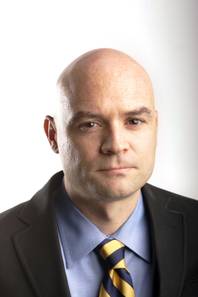Tuesday, Feb. 22, 2011 | 2:01 a.m.

J. Patrick Coolican
Nichole Ray is explaining some of the etiquette that will be expected when the students dine with an impressive group of adults this week. She palms a water glass from the top like it’s a football.
“Don’t grab it like this,” she says. “It’s not a can of Coke.”
Ray is sitting at a long table, covered in a white tablecloth and all the best settings, with a dozen of our best teens from the Boys & Girls Clubs of Las Vegas, where she volunteers.
The teens are learning how to sit at a table, eat and converse with the city’s power elite. Wednesday, 75 teens from the Boys & Girls Clubs will be paired with adults for dinner at Panevino at an event called Steak & Burger. The kids eat steaks, the adults eat burgers. In addition to knowing which fork to use for the salad course, the teens — one hopes — will be dressed appropriately and keep the conversation flowing by using techniques they’ve learned during their etiquette lesson.
This may seem like a hokey exercise, even a tad patronizing. But it’s sort of a big deal.
To begin with, if we’re to rebuild our city, we need these kids to succeed. I recently wrote an article that examined whether we have a brain-drain problem — losing our best and brightest to out-of-state schools and other cities such as New York and San Francisco.
The short answer is that, yes, this is happening, but geographer and economic development expert Jim Russell delivered an important insight: Sure, the elite kids will leave, but you should be proud that you’ve given them the education and skills to find success elsewhere and let them go, because they’re going to go anyway.
Where you should focus your attention, Russell said, is on the diamonds-in-the-rough, the first-in-the-family to go college, who will be grateful for the opportunity you’ve given them and stay home and help build a new Las Vegas.
In other words, these kids in the etiquette class at the Lied Boys & Girls Club on Lindell Road. Kids like the Boys & Girls Club’s Youth of the Year, Angelena Cook.
She’s been coming to the club for 11 years and has done community service projects related to teen homelessness, prostitution and child soldiers. She’s off to college, either UNLV or Nevada State College, in the fall.
Yvette Barajas, who works for Wells Fargo, is instructing a different group in how to make conversation.
“You want to get to know them. They’re getting to know you. Make them feel comfortable,” she tells the teens.
Over in “Dress for Success,” Will Burrell, who works for Boys & Girls Clubs of Las Vegas, tells his group, “If you’re dressed nice, you’ll feel good. If you feel good, you’ll perform.”
A teen pipes up: “You shouldn’t wear too much makeup or cologne or perfume, right?”
Right, he says.
For many of us, these lessons were instilled from Day One. I remember a brutal dressing down my three brothers and I received once when a friend of my parents entered the room, and we didn’t offer her our seats, shake her hand or introduce ourselves. I was no more than 10 when I learned how to tie a necktie, and my parents constantly instructed us in proper table manners.
(Later, especially as an angsty adolescent, I would often willfully forget all this good instruction, to comic effect, like when I wore white socks with a dark suit to a college job interview. When the man asked about my weaknesses, I sullenly responded, “I’m not good with people.” It was a sales job.)
But many kids won’t get this instruction at home, through no fault of their own or even the fault of their parents, who probably never learned these rituals either. And it’s not instinctual. Looking a stranger in the eye as you shake his hand can still seem awkward to many people.
Once we get kids reading and computing, we need to teach these other skills, because they matter.
I’m reminded of Malcolm Gladwell’s “Outliers,” in which he examines supersuccessful people and tries to determine how they got there. He concludes that although each of them, to be sure, is talented and hardworking, a massive part of their success can be attributed to various bits of good luck and a social environment that pushed them in the right direction. If you’re a successful person, think of all the great things that have happened to you — the mentor who appeared out of nowhere, the client who fell from the sky — that happened even though they didn’t have to happen. Or all the ways your upbringing shaped you in ways you don’t even think about.
Perhaps these 75 kids will someday look back at the Steak & Burger event and realize that it was an important piece of Gladwellian serendipity, an encounter that launched them.
And maybe next year, instead of 75 kids at Steak & Burger, we’ll have 300.
If you’d like to help, go to bgclv.org or call 367-2582.

Join the Discussion:
Check this out for a full explanation of our conversion to the LiveFyre commenting system and instructions on how to sign up for an account.
Full comments policy